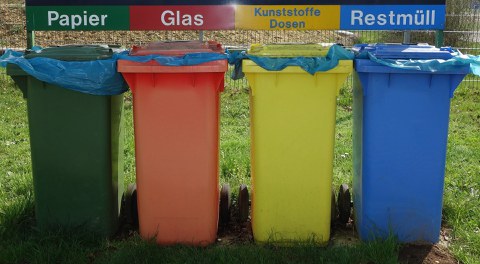May 25, 2021
On the way to "Zero Waste": New DIN standard developed with the participation of TU Dresden
Together with a consortium of NGOs, science and industry, the Institute for Waste Management and Circular Economy at TU Dresden has developed a new DIN standard for the development of sustainable waste and recyclable materials management. The aim of the so-called DIN SPEC 91436 is to reduce waste and optimize recycling and disposal. The new DIN standard is aimed at all companies and organizations that generate waste and who, with the help of DIN SPEC, can align their waste and recyclable materials management with the vision of “zero waste” and have them certified.
"Zero waste is a beneficial and visionary goal for sustainable cycles," says Christina Dornack, professor at the Institute for Waste Management and Circular Economy. “It is a process in which the status quo with regard to consumption habits and waste production is questioned and optimized step by step in the sense of a real circular economy. This means that products and processes should be designed in such a way that the volume and harmfulness of waste, as well as primary materials and energy, are reduced."
The initiative to develop the new DIN standard goes back to PreZero, the environmental division of the Schwarz Group. Europe's largest retail company wants to have the new specification tested by Kaufland and Lidl in selected countries as part of a pilot phase in order to implement certification according to DIN SPEC 91436 there from 2022. In the spirit of “Zero Waste”, the amount of waste is to be reduced and unavoidable waste to be used sustainably. Specifically, this can be achieved through consumption reduction, waste avoidance, repairs, reuse, composting, generation of biogas and recycling as well as through the sustainable and careful use of resources. In addition, a transparent handling of resources and information is required in order to successfully introduce cycles. At the end of the day, the new standard should describe a holistic reference model to measure and improve the maturity of waste and recyclable materials management.
“Raising awareness is essential for the success of Zero Waste. This has to happen both internally, i.e. to the employees who have to deal with the associated measures, and externally with partners and customers in order to create understanding for changes and generate a multiplier effect, "explains Christina Dornack. "The aim is to reduce discharges into land, water or air in order to create a sustainable future for current and future generations."
In addition to PreZero and the Institute for Waste and Recycling Management at TU Dresden, DEKRA, TüV Süd and other organizations and companies that are committed to efficient recycling management such as Circular Berlin, Repag or Resourcify were involved in the drafting. For the user, the DIN-SPEC standard is a free and freely available standard that can also serve as a basis for certification and form the preliminary stage to a standard. DIN SPEC 91436 with the title "Reference model for operational waste and recyclable materials management aligned with a vision of 'Zero Waste" "can be downloaded free of charge from Beuth Verlag at www.beuth.de.
Information for Journalists:
Prof. Christina Dornack
Institute for Waste Management and Circular Economy
Tel.: +49 351 463-44130

